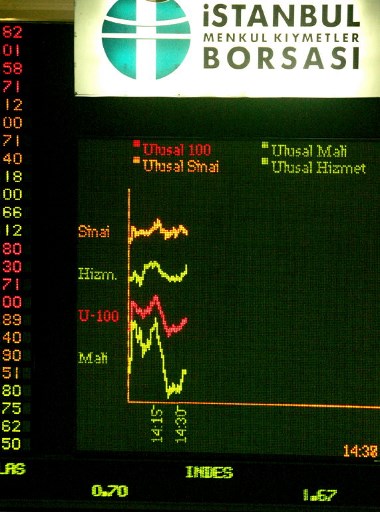Turkey’s new media law is bad news – but don’t report it
If you are in Turkey, think twice about tweeting this article.
With a new controversial social media law, Turkish authorities now have the right to control and, if necessary, restrict online free speech in ways that would be unthinkable in any democracy — or even in Turkey a few years ago.
Turkish President Recep Tayyip Erdoğan’s government has long been criticized for muzzling dissident voices and exerting its control over mainstream media — but with a high penetration rate, social media in Turkey has been a relatively open forum for independent journalism and debate.
Now in a true Orwellian fashion, Turkey’s “disinformation” law aims to criminalize the spread of misinformation, as defined by the government, and regulate content. But critics fear that in the run-up to 2023 elections, the new rules might be used to silence the opposition campaigns and restrict the already-narrow space for public debate. Worse, the bill allows the government to block Twitter or Facebook when it deems necessary or force them to share data with authorities.
The new legislative package, which passed the parliament this week amidst protests and international criticism, calls for up to four-to-five years’ imprisonment for stories and posts that “spread information that is inaccurate” in order to “create fear, panic” or “disrupt Turkey’s domestic and external security”, “public order”, “public health.”
That practically criminalizes any piece of information that is not sanctioned by local authorities.
Take inflation, for example, one of the most hotly debated issues in the country. Turkey’s official statistics agency puts the country’s annual inflation at 83.45% but the official figure is questioned by many, including economists and journalist who claim the year-on-year price hike is nearly double. An independent watchdog, ENAG, finds yearly consumer inflation for September to be 186%. Under the new law, ENAG’s regular updates, as well as its social media posts could be banned – and those that share its content may be equally penalized. Similarly, any suggestion that Turkey’s official COVID-19 death figures are actually higher, that energy prices are likely to go up, or that the government is mishandling forest fires could be liable.
And whistleblowers — forget it. Investigative journalism would practically be impossible under the new law.
But in a country deeply polarized along political lines, with a mounting opposition against the Erdoğan rule, who can truly define “the truth” and spot “disinformation”? Leave it to the Turkish prosecutors, the new legislation says. Human rights columnist Gökçer Tahincioğlu notes that the bill has given sweeping mandate to prosecutors to identify what the truth is and seek legal course against what they see as inaccurate. In a country where courts have already gone after journalists and economists for tweeting, right in the middle of a currency crises, that the Turkish lira is likely to lose value against the dollar, this doesn’t sound good.
The new legislation is certainly not the first attempt by Erdoğan’s ruling Justice and Development Party (AKP) and their nationalist allies to tighten controls over media — but the current bill, dubbed a “censorship law” by opposition and rights groups, is certainly the toughest one. In 2020, Turkish lawmakers gave government sweeping powers to regulate social media content and mandated tech companies — including Twitter, Facebook, and YouTube — to open offices in Turkey. The government also imposed financial penalties and threatened to slow the traffic to these sites if their conditions were not met.
Now, it is tightening the screws one more notch. Tech giants are required by law to appoint Turkish citizens to run their local office, keep their data in Turkey, and provide information about users if the government asks — or face blockages.
This seems to place a sizeable responsibility on global companies to find the right balance between staying open and preventing reputational damage if they become too compliant. Given the popularity of social media platforms in the country, and the ease with which Turkey’s government can slap a “terrorism” label on dissidents, the challenge is real. Messaging apps like Signal, Facetime, and WhatsApp are widely used and have become the preferred method of correspondence for citizens and officials alike. The government now wants to be regularly updated about how many users there are, who talks to who, and if necessary, what they talked about. In some instances, they can demand encryption data and restrict usage otherwise.
In a country with a history of government eavesdropping and where even grandparents prefer WhatsApp to talk to family members, the new bill takes away one more layer of privacy for ordinary citizens.
Facing electoral hurdles and dwindling support, Turkey’s ruling conservative-nationalist coalition seems to have picked a page from the authoritarian playbook — hoping to control the information space in the run-up to the election. To critics, the new law reinforces the notion that the ruling coalition is willing to resort to illiberal means to stay in power.
Turkey’s “disinformation” law certainly makes it one step more difficult to campaign and organize for Erdogan’s opponents and takes away one more freedom for its citizens. It narrows the space for debate and information sharing. And worse, if the upcoming 2023 election results are tight or contested, and the Turkish government’s attitude is anything like that of former U.S. President Donald Trump in 2018, the new law can prevent a meaningful pushback against government claims.
But the new law is unlikely to fundamentally alter Turkey’s election dynamics. Turkey is a peculiar place in the sense that it is not fully democratic, but it isn’t a dictatorship either. Despite its illiberal turn, Turkey, unlike Russia and China, still has a strong opposition and a vibrant debate. Rather than change people’s opinions, the new law is more likely to irritate voters and repel young Turks who are already frustrated with unemployment and increasingly alienated from the government’s conservative agenda.
In the end, Turkish voters will make their decisions based on the economy and on the competency of the presidential candidates. Erdoğan is clearly the choice of the ruling Islamist-nationalist coalition but nearly all polls suggest that the desire for change is slightly bigger than that the support for Erdoğan. That means Turkey’s opposition bloc still has a chance if it can pick the right candidate and convince the voters about their ability to govern. It’s not a given, but it’s possible.
And along the way, if there are social media blackouts and persecutions, that will only make voters angrier.




